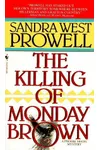Picture a Montana-born storyteller who spun gritty mysteries as tough as the barbed wire of her homeland—meet Sandra West Prowell! A fourth-generation Montanan, Prowell carved her name in the mystery genre with her unforgettable Phoebe Siegel series, blending suspense, authentic Western settings, and a fierce female lead who captivated readers worldwide.
With her sharp wit and knack for crafting page-turners, Prowell’s novels like By Evil Means and The Killing of Monday Brown earned critical acclaim, awards, and a loyal following. Her stories aren’t just mysteries—they’re a love letter to Montana’s rugged landscapes and complex cultures. Let’s dive into the life and legacy of this remarkable author!
The Making of Sandra West Prowell
Born on January 1, 1944, in Helena, Montana, Sandra West Prowell grew up immersed in the Big Sky State’s vast horizons and rich Native American heritage. A self-described '48-year-old, menopausal grandmother' when she debuted, Prowell never attended high school but earned her GED later in life, proving that passion trumps formal education. Her eclectic career—dog groomer, photographer, licensed practical nurse, radio traffic manager—infused her writing with a raw, lived-in authenticity. Inspired by her love of literature and Montana’s storytelling traditions, she co-founded the Montana Authors Coalition in 1989 to champion local writers, setting the stage for her own literary breakthrough.
Sandra West Prowell’s Unforgettable Stories
Prowell’s Phoebe Siegel series, starring a half-Jewish, half-Irish Catholic ex-cop turned private investigator, redefined the mystery genre with its bold protagonist and vivid Montana backdrop. Her debut, By Evil Means (1993), follows Phoebe as she uncovers dark secrets at a shady rehab center, earning nominations for the Shamus, Dilys, and Hammett awards for its gripping narrative and nuanced characters. The Killing of Monday Brown (1994) dives into crime on a Crow reservation, tackling cultural theft and prejudice with a Shamus-nominated plot that The New York Times praised as 'fascinating.'
When Wallflowers Die (1996), the third in the series, sees Phoebe unravel a 27-year-old murder tied to a gubernatorial candidate, blending suspense with personal stakes. Prowell’s style—fast-paced, character-driven, and steeped in Montana’s landscapes—sets her apart. Her stories weave Native American lore, local customs, and Phoebe’s sharp-tongued humor, creating mysteries that feel both thrilling and deeply human. Fans compare her to Sue Grafton and Sara Paretsky, but Prowell’s Western grit is uniquely her own.
Why Sandra West Prowell Matters
Sandra West Prowell’s impact transcends her three novels. Her authentic portrayal of Montana’s people, especially Native American communities, brought depth to the mystery genre, challenging stereotypes and enriching cultural narratives. As a trailblazer for women in crime fiction, her creation of Phoebe Siegel—a tough, flawed, yet relatable PI—inspired readers and writers alike. Prowell’s work with the Montana Authors Coalition nurtured a vibrant literary scene, cementing her as a cultural force. Though she passed away in August 2015, her manuscripts, discovered by family, hint at unpublished gems, keeping fans hopeful for more.
- Born: January 1, 1944, Helena, Montana
- Key Works: By Evil Means, The Killing of Monday Brown, When Wallflowers Die
- Awards: Nominated for Shamus, Dilys, and Hammett Prizes
- Fun Fact: Prowell named her pet parrot after Phoebe Siegel!
Snag By Evil Means and dive into Sandra West Prowell’s thrilling mysteries—Montana’s secrets await!


